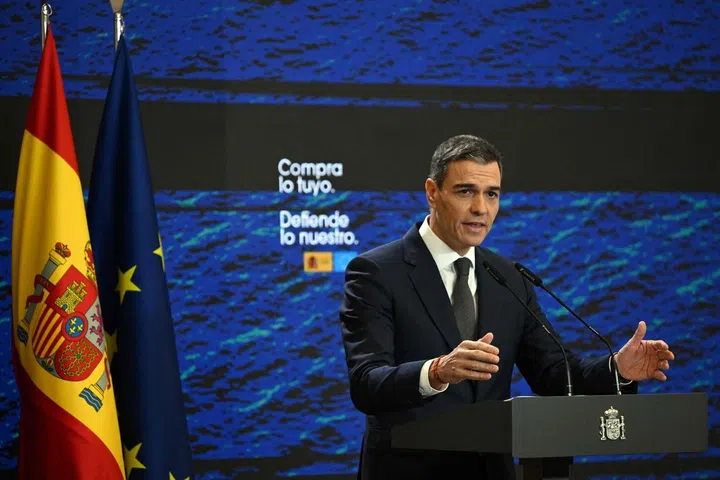Spain PM heads to China, Vietnam as US tariff blitz bites
MADRID – Spanish Prime Minister Pedro Sanchez aims to open new market opportunities during a visit to China and Vietnam this week on the heels of US President Donald Trump’s sweeping tariffs.
The trip comes as the European Union rethinks its global trading relationships amid turmoil caused by the US import duties announced last week that have sent world markets into a tailspin.
Mr Sanchez is to arrive in Hanoi on April 9 for talks with Vietnam’s top leader, Mr To Lam, on the same day Mr Trump’s 20 per cent tariffs on EU products come into force.
On April 10, he will travel to Ho Chi Minh City, the Asian manufacturing powerhouse’s commercial capital, to meet business leaders.
The Socialist Prime Minister then heads to China for his third visit in just over two years, where he is scheduled to meet President Xi Jinping and Chinese investors on April 11.
China and Vietnam currently sell much more to Spain than they buy.
Mr Trump last week announced he would hit China with an additional 34 per cent tariff on top of a 20 per cent levy imposed in 2025.
On April 7, he threatened additional tariffs of 50 per cent from April 9 if China did not withdraw its retaliatory measures.
Vietnam, where Mr Sanchez will make the first official visit by a Spanish prime minister, is to be hit with a thumping 46 per cent tariff.
A mistake
Mr Sanchez broke with the rest of the EU on his last trip to China in September 2024, urging the bloc to reconsider plans to impose high tariffs on Chinese electric cars and calling for a “fair trade order”.
The EU argued that the tariffs were necessary to protect European producers from unfair competition from state-backed Chinese firms.
China reacted by launching a probe into imports of EU pork products. Spain is the bloc’s biggest exporter of pork products to China.
Mr Sanchez “has tried to present himself as a bridge between Brussels and China and to be one of the voices calling for pragmatism” that puts the economy first, said Ms Ines Arco, an Asia specialist at the Barcelona Centre for International Affairs, a think-tank.
Spain’s conservative opposition and media have however accused Mr Sanchez of acting on his own and without coordination with Brussels.
“It’s a mistake to want to switch from the United States to China overnight,” said Mr Alberto Nunez Feijoo, leader of Spain’s main opposition conservative Popular Party
Level playing field
Brussels, however, has recently signalled that it wants smoother ties with Beijing.
After Mr Trump’s return to the White House in January, EU chief Ursula von der Leyen called for “constructive engagement with China”.
And the bloc’s trade commissioner, Mr Maros Sefcovic, recently visited China to “promote a more balanced and cooperative trade relationship”.
The “clear objective” of Mr Sanchez’s trip is to increase Spain’s exports to China, given the huge trade imbalance that exists, said Dr Miguel Otero, a senior analyst at the Elcano Royal Institute think-tank in Madrid.
Spain buys some €45 billion (S$66.46 billion) of goods from China per year, its fourth-largest trading partner, but sells it just €7.4 billion.
Mr Sanchez will also seek to attract more green tech investment after Chinese carmaker Chery announced in 2024 it would open its first European electric car factory in Barcelona.
Another major Chinese carmaker, BYD, is mulling over a new investment in Europe after opening an electric vehicle plant in Hungary, and Spain could be a candidate, said Ms Arco.
Spanish Economy Minister Carlos Cuerpo said on April 7 that Madrid wants to reach “negotiated agreements” with China “to open up our markets, but always with a degree of protection... our companies, our industries should play on a level playing field”. AFP
